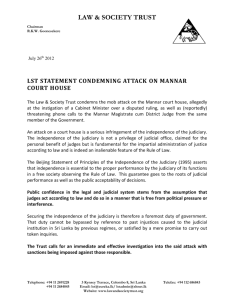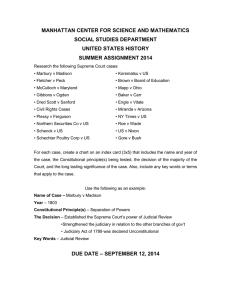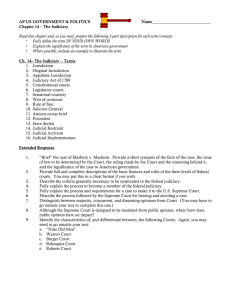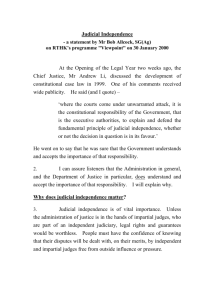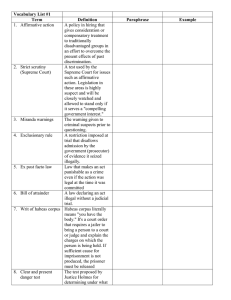C orporate ounsel T h e M e t r o...
advertisement
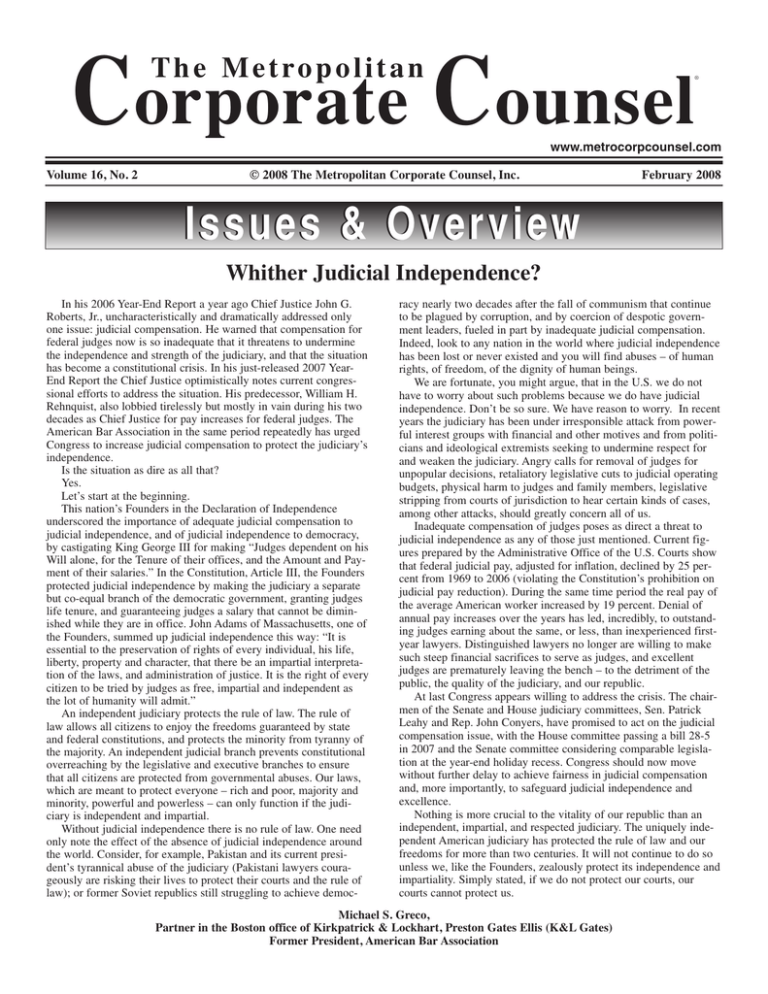
Corporate Counsel The Metropolitan ® www.metrocorpcounsel.com Volume 16, No. 2 © 2008 The Metropolitan Corporate Counsel, Inc. February 2008 Issues & Overview Whither Judicial Independence? In his 2006 Year-End Report a year ago Chief Justice John G. Roberts, Jr., uncharacteristically and dramatically addressed only one issue: judicial compensation. He warned that compensation for federal judges now is so inadequate that it threatens to undermine the independence and strength of the judiciary, and that the situation has become a constitutional crisis. In his just-released 2007 YearEnd Report the Chief Justice optimistically notes current congressional efforts to address the situation. His predecessor, William H. Rehnquist, also lobbied tirelessly but mostly in vain during his two decades as Chief Justice for pay increases for federal judges. The American Bar Association in the same period repeatedly has urged Congress to increase judicial compensation to protect the judiciary’s independence. Is the situation as dire as all that? Yes. Let’s start at the beginning. This nation’s Founders in the Declaration of Independence underscored the importance of adequate judicial compensation to judicial independence, and of judicial independence to democracy, by castigating King George III for making “Judges dependent on his Will alone, for the Tenure of their offices, and the Amount and Payment of their salaries.” In the Constitution, Article III, the Founders protected judicial independence by making the judiciary a separate but co-equal branch of the democratic government, granting judges life tenure, and guaranteeing judges a salary that cannot be diminished while they are in office. John Adams of Massachusetts, one of the Founders, summed up judicial independence this way: “It is essential to the preservation of rights of every individual, his life, liberty, property and character, that there be an impartial interpretation of the laws, and administration of justice. It is the right of every citizen to be tried by judges as free, impartial and independent as the lot of humanity will admit.” An independent judiciary protects the rule of law. The rule of law allows all citizens to enjoy the freedoms guaranteed by state and federal constitutions, and protects the minority from tyranny of the majority. An independent judicial branch prevents constitutional overreaching by the legislative and executive branches to ensure that all citizens are protected from governmental abuses. Our laws, which are meant to protect everyone – rich and poor, majority and minority, powerful and powerless – can only function if the judiciary is independent and impartial. Without judicial independence there is no rule of law. One need only note the effect of the absence of judicial independence around the world. Consider, for example, Pakistan and its current president’s tyrannical abuse of the judiciary (Pakistani lawyers courageously are risking their lives to protect their courts and the rule of law); or former Soviet republics still struggling to achieve democ- racy nearly two decades after the fall of communism that continue to be plagued by corruption, and by coercion of despotic government leaders, fueled in part by inadequate judicial compensation. Indeed, look to any nation in the world where judicial independence has been lost or never existed and you will find abuses – of human rights, of freedom, of the dignity of human beings. We are fortunate, you might argue, that in the U.S. we do not have to worry about such problems because we do have judicial independence. Don’t be so sure. We have reason to worry. In recent years the judiciary has been under irresponsible attack from powerful interest groups with financial and other motives and from politicians and ideological extremists seeking to undermine respect for and weaken the judiciary. Angry calls for removal of judges for unpopular decisions, retaliatory legislative cuts to judicial operating budgets, physical harm to judges and family members, legislative stripping from courts of jurisdiction to hear certain kinds of cases, among other attacks, should greatly concern all of us. Inadequate compensation of judges poses as direct a threat to judicial independence as any of those just mentioned. Current figures prepared by the Administrative Office of the U.S. Courts show that federal judicial pay, adjusted for inflation, declined by 25 percent from 1969 to 2006 (violating the Constitution’s prohibition on judicial pay reduction). During the same time period the real pay of the average American worker increased by 19 percent. Denial of annual pay increases over the years has led, incredibly, to outstanding judges earning about the same, or less, than inexperienced firstyear lawyers. Distinguished lawyers no longer are willing to make such steep financial sacrifices to serve as judges, and excellent judges are prematurely leaving the bench – to the detriment of the public, the quality of the judiciary, and our republic. At last Congress appears willing to address the crisis. The chairmen of the Senate and House judiciary committees, Sen. Patrick Leahy and Rep. John Conyers, have promised to act on the judicial compensation issue, with the House committee passing a bill 28-5 in 2007 and the Senate committee considering comparable legislation at the year-end holiday recess. Congress should now move without further delay to achieve fairness in judicial compensation and, more importantly, to safeguard judicial independence and excellence. Nothing is more crucial to the vitality of our republic than an independent, impartial, and respected judiciary. The uniquely independent American judiciary has protected the rule of law and our freedoms for more than two centuries. It will not continue to do so unless we, like the Founders, zealously protect its independence and impartiality. Simply stated, if we do not protect our courts, our courts cannot protect us. Michael S. Greco, Partner in the Boston office of Kirkpatrick & Lockhart, Preston Gates Ellis (K&L Gates) Former President, American Bar Association

